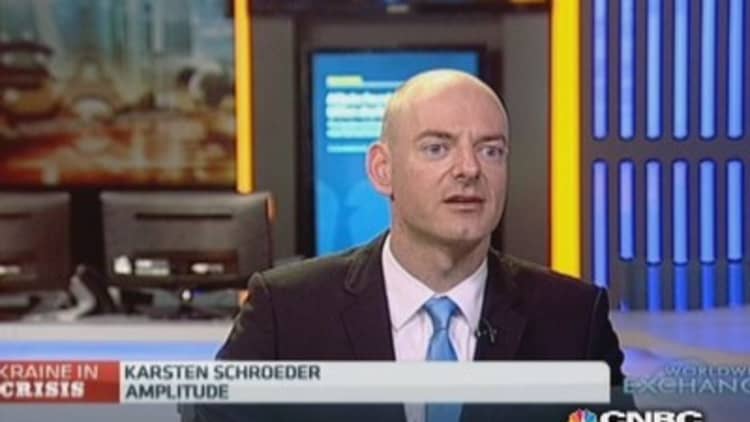Tougher Western sanctions announced Monday against Russia could have serious consequences for that country's monolithic, energy-reliant economy, but experts say the punishment also could trigger retaliation from Moscow against American and European multinationals.
"There no doubt would be Russian retaliation," said Justin Logan, director of foreign policy studies at the Cato Institute. "Companies with money tied up in Russia would have a tough time getting it back out."
The Obama administration on Monday imposed sanctions against seven Russian officials and 17 companies in its latest step to punish Moscow for its intervention in Ukraine. Among those singled out for sanctions was Igor Sechin, the chief executive of Russian oil giant Rosneft.
Last week, President Barack Obama and the leaders of Germany, the United Kingdom, France and Italy warned that they were ready to inflict targeted sanctions against Russia if Moscow escalates tensions in and around Ukraine.
The lion's share of foreign money in Russia is from major energy sector players like Shell, Exxon, and BP, said Fadel Gheit, senior energy analyst at Oppenheimer.
Shell is working with Gazprom on natural gas extraction in Russia; Exxon has a multibillion dollar exploration partnership with Rosneft, a major oil producer controlled by the Russian government, and BP owns nearly 20 percent of Rosneft.
"Shell and Exxon have physical assets in Russia," said Gheit. "But pound-for-pound, BP has the biggest exposure in Russia."
Although BP may have the most to lose from an economic tug-of-war between Moscow and the West, tough lessons that BP learned in Russia—through a defunct partnership with Rosneft called TNK-BP—also make BP best equipped for any future fallout, said Nicholas Spiro, managing director of Spiro Sovereign Strategy.
"They've already been in the crosshairs. They've already endured severe political problems in Russia," said Spiro. "Out of all the companies, BP is probably the best prepared."
BP declined CNBC's request for a direct comment, but released a statement Monday saying that it intends to remain a long-term investor in Rosneft.
Firms from across Europe, US operate in Russia
| Country | Company | Stakes |
| Britain | BP | Has roughly 20% stake in Russian state-owned Rosneft |
| Germany | BASF | Partnership with Gazprom - agreement in Dec. 13 to swap assets |
| France | Total | Partnership with Russia's Novatek; has 20% stake in LNG project |
| Italy | ENI | Partnerships with both Gazprom and Rosneft |
| Norway | Statoil | Has Barents Sea projects with Rosneft |
| United States | ExxonMobil | $500 billion joint venture with Rosneft in the Artic Sea |
Spiro said that several German firms have also steeled themselves for possible fallout from friction between the Russia and the West.
"German companies are huge here," said Spiro, naming BASF, energy firm RWE, and Siemens as companies with operations in Russia.
BASF is working to finalize a deal with Gazprom that would give it a stake in Siberian oil fields; RWE has reached a preliminary deal to sell its natural gas subsidiary to Russian billionaires Mikhail Fridman and German Khan, and Siemens has a partnership with state-run railroad monopoly Russian Railways.
Late last month, Siemens CEO Joe Kaeser made a trip to Moscow to meet with Russian President Vladimir Putin at his residence and voice support for a "trusting relationship" with Russian companies.

Spiro sees the results of interactions like these between German companies and Russia as a bellwether for future deals between Russia and the West as a whole.
"We know that if the West's resolve starts to crumble, it will almost certainly start in Germany," said Spiro, citing historical relations and Germany's status as an engine of the European economy. "That's the canary in the coal mine."
Art Hogan, chief market strategist at Wunderlich Securities, agreed.
"It starts with Germany and works its way down," said Hogan. "They have the most trade back-and-forth, and Germany gets the highest percentage of its energy from Russia."
Barry Ickes, financial director at The New Economic School in Moscow and an economics professor at Pennsylvania State University, said that aside from German firms, some American companies outside the energy sector also have operations in Russia, including Alcoa and Boeing.
Alcoa owns aluminum fabrication facilities in Russia, and Boeing has a design center in Moscow, as well as a joint venture with VSMPO-Avisma, the world's largest titanium producer.
Members of the Russian parliament have also proposed charging international payments companies like Visa and Mastercard with pre-emptive "security fees," with the stated aim of preparing for future financial disruptions. And Russia continues to work on the creation of its own domestic payment system to rival those of international competitors.
Ickes pointed out that if any of those projects came to fruition, they wouldn't be capable of crippling international payment systems, though they would still be felt.
"Visa and Mastercard are huge," said Ickes.
—CNBC's Mathilde Hamel contributed to this report.




